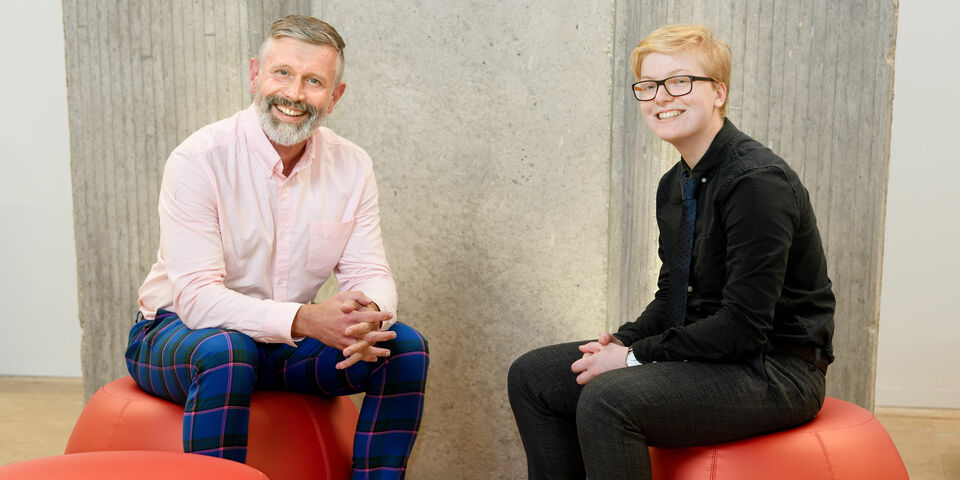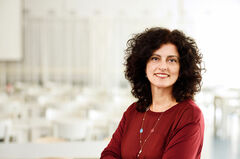Will students be getting a Diversity Officer?
For the past two years TU/e has had a Diversity Officer for its employees. Oddly enough, there is no equivalent for students. Arthur Nijdam (member of the ESR faction) argued this month on the University Council that this position should be created. While the university administration made no immediate promise, his proposal was well received.
“Diversity regarding gender, culture or ethnicity is an equally vibrant issue among the 12,000-plus students on this campus. So to my mind a Diversity Officer is hardly an unnecessary extravagance,” says Arthur Nijdam.
Rector Magnificus Frank Baaijens reacted positively to the suggestion made by the third-year student of Biomedical Engineering. “The question is how we can implement this. I am keen to talk with a number of individuals within our organization and I hope that you will give me some time to look into this.”
Diversity offers opportunities
Thus it seems only a matter of time before we have a Diversity Officer in place to champion diversity and inclusivity among the student community. And this is urgently needed, believes Nijdam. “I would really like to show TU/e the opportunities that diversity can offer. In my view, these are not being fully utilized. It is good idea to start a discussion on this topic, and to set people thinking.”
Despite the good intentions of the university's administration, he sees few tangible changes at the university. Everyday matters like gender-neutral enrolment forms, bathrooms and the like still haven't been organized. While these may seem like trivial issues, they are experienced as being deeply hurtful.
There are other matters that concern Nijdam. He is fighting for a safe and respectful campus not only on the University Council, but also as a member of Compass. This unique community includes students and employees of a diversity of ages, orientation and gender identity. Another Compass member is Steven Ralston, teacher of academic English, interpreter, translator and an employee of the TU/e Language Center, part of Education and Student Affairs (ESA). He too sees plenty of scope for improvement.
Foreign students
Ralston: “As Compass we are putting two important issues on the agenda. There is a large foreign community at TU/e, but these students often come from countries where the subject of alternative forms of sexuality cannot be broached. In some instances they choose to study in the Netherlands specifically because they expect to find more acceptance here. It is difficult to establish whether their experience lives up to their expectations. It is not easy to make contact with them. They are diffident about revealing their sexual preferences.”
The same applies to employees at TU/e, believes Ralston. “Compass is a mix of students and employees, young and old. I sometimes speak with newcomers. In some cases they choose not to come out of the closet in their professional environment. They are terrified that it may be damaging to their career. This is a serious matter. It clearly shows that safety at TU/e is inadequate.”
Ombudspeople
Nonetheless, employees and students wishing to defend themselves do have options. TU/e has ombudspeople, academic advisors and student psychologists to whom anyone can turn to discuss problems. Arthur: “This provision is well coordinated. These people consult with one another. Academic advisors give advice when asked and on their own initiative. So there are channels for people who feel wronged or unsafe.”
"A change of culture needs more time and people"
The Diversity Officer for employees is Evangelia Demerouti. Since September 2017 she has been working to increase diversity and inclusivity (D&I) among employees. “My role with the Executive Board is only an advisory one. But it is a big challenge because D&I is a complex subject.” A Diversity Officer for students is, she believes, a good idea. But she does not see herself as being the right person for the job.
“My background is in work & organizational psychology. I know how you can change organizations and which factors and interventions can help to increase D&I. While increasing D&I among students has parallels, it is not the same. It requires different measures for which a background in pedagogy is essential. My knowledge is relevant but would have to be complemented with more specific skills.”
That fact that concrete changes trickle down only slowly at the university is because a change in culture is involved, Demerouti believes. “That takes time. To bring it about we have to talk with various people so that ultimately ideas and actions to improve D&I are volunteered from every corner of TU/e.”
Diversity Committee
At present Demerouti works on D&I one day a week and Corlien van Dam, in her role as HR policy advisor, at most two days a week. Then there's also Janna Behnke, one of Demerouti's PhD candidates, who will gain her doctorate with a study on D&I. She is conducting an action research project of sorts under the supervision of Demerouti and her colleague Sonja Rispens. Among other things, Behnke is developing interventions for TU/e employees. Finally, there is a Diversity Committee that meets four times a year to brainstorm D&I matters.
Role models
Demerouti: “Converting all the ideas and suggestions into tangible and visible things involves a lot of work. Like conducting interviews with role models and converting these into communication tools; having discussions, meetings, and negotiations in preparation for setting up a program of leadership training; developing and testing this training; and developing a D&I-friendly tool for the selection and assessment of new employees. And I haven't even mentioned the studies and experiments in the field of D&I that we are carrying out at TU/e. All these activities require more people than are currently available. The process can only be accelerated if more support is provided. We need a small group of people who will implement the ideas. In the fields of HR, communication, policy and perhaps finance.”



Discussion